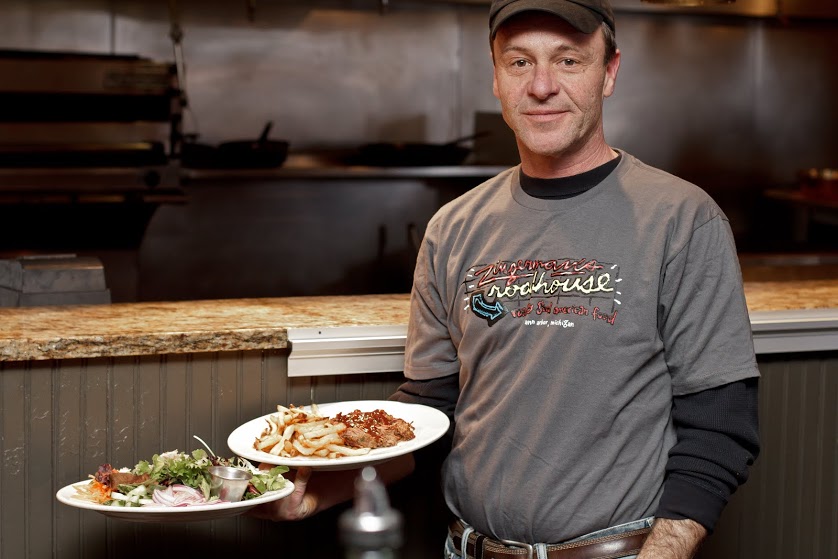Chef Alex Hits the Road to Eliminate Childhood Hunger

Last week, Zingerman’s Roadhouse Executive Chef Alex Young took a mini-tour of Baltimore and Washington D.C. with an organization called Share Our Strength, a group dedicated to ending childhood hunger. We recently caught up with Alex for more details:
Tell us about your tour…
I toured Baltimore with the folks from Share Our Strength and eleven other chefs from around the country. They took us to these vast areas of the city where there are no food stores, there is no work, and there is no nothing. It is just unbelievable. But in Baltimore, they’ve created some really fantastic systems to get food to these kids. The Share Our Strength/No Kid Hungry organization has looked at each of these individual areas, each of these individual schools, and has come up with really creative solutions to get these people food. They’ve really done a lot of wonderful things.
What can you tell us about Share Our Strength?
Share Our Strength was founded by Billy and Debbie Shore in 1984 in response to the famine in Ethiopia. Since that time, they’ve transitioned to spending more and more resources in this country. More recently their goal has been shifted to “ending childhood hunger by 2015.
There are a lot of kids pre-K thru 12 who are on free and reduced cost lunch programs at school who currently receive food, but there are lots of kids eligible for these programs who do not receive food. There are many reasons why a child eligible for these programs does not receive food, and much of it has to do with stigma and peer pressure. Variables like the school environment, how the food is delivered, how it’s made available, what time it’s made available, all of these things play into whether or not a child elects to receive food even if they are hungry.
In Michigan, for example, only about 53% of eligible kids actually receive lunches. And just 13% of those kids receive lunch or breakfast in the summertime. And you can bet if you are poor and live in a food desert in places like Detroit, or many other parts of our state, or even say an isolated trailer park or home in a rural areas of the state, you can’t get to the where the free and reduced food is being distributed and most of these kids sit there hungry all summer long. They either live too far with no transportation, or the area isn’t safe…they just can’t get to the food. In these areas, there are no grocery stores within 2-3 miles of these people, which fits the definition of a food dessert. *
Michigan is truly in great need. Michigan is economically suffering, and the children are really the key to the future. If you start with kids and educate them, there is hope. And the reality is that for many of these kids, the only real square meal they get each day is the school lunch. And kids simply cannot learn if they’re hungry. There are many, many studies that show the negative effects of lack of nutrition on one’s ability to learn.
What did you learn in Baltimore that might help fix this?
In Baltimore, they figured out a way to get meals delivered to classrooms under the free and reduced cost meals program before the first bell goes off. The kids eat their breakfast, they clean up after themselves, and they go about their lessons, and they are so much more focused. Teachers love it. They are singing the praises of this program because the kids are not hungry and distracted; they’re more focused and they learn better. We spent all day [last] Monday in these areas of Baltimore and hearing from teachers and program administrators.
But that was just the first stop?
Right. So on Tuesday, we got a nice tour of the White House with Sam Kass, chef at the White House. In addition to his duties as chef, he’s Senior Policy Advisor for Nutrition Policy, and he also works very closely with the First Lady on her initiatives to end childhood hunger.
From the White House, we then went to Capitol Hill to meet with U.S. Senators, Representatives, and their staffs. We met with U.S. Sen. Debbie Stabenow’s staff, for example. All twelve chefs on the tour met with these folks to tell them about our tour. We all had bullet points to discuss why this issue is important, what we saw in Baltimore, and what we’d like them to do to help us. We know that many of these folks have [congressional] breaks coming up, and we lobbied them to come and visit some of these food desert sites with us. The Child Nutrition and WIC Reauthorization Act is also coming up for renewal next year. It’s very important that this act is reauthorized, and that we have enough people in congress on the right side of this issue.
We’re not asking for anything new, we’re just asking that we be more creative in getting these kids the food they need. All of these programs already exist; they’re already funded, they’re already paid for, they’re already available. What we need to do is push our elected officials, and folks the private sector, like us, in getting this done. In some instances, you have to get permission from one state department, and then permission from another department to do the very same thing. So, we’re just trying to get past these silly little political roadblocks and get this stuff done.
What’s next?
So, the next steps are to reconvene with Share Our Strength and coordinate our efforts. By many accounts, there will likely be a big turnover in the House of Representatives next year. Many of the incumbents, such as U.S. Rep. John Dingell for example, have done a tremendous job on this issue in their careers. But he’s retiring, and we need to start working on this now, and hopefully, get it in front of the candidates before the election. It’s an opportunity for the public, with a little bit of information, to make better choices.
These are very important issues, in my opinion. The very basis of our communities is our children, so this has huge economic implications. We need to talk to the people who are running, and help them understand how they can do a better job on these issues. And we also need to enlist more private sector people, make them aware of these issues, and see what they can do to help. Share Our Strength currently doesn’t have many champions in Michigan, and that’s something that I’d like to change.
How would you sum up your tour?
It was very sobering, but it was also very inspiring.
I’m reminded of something that [Zingerman’s co-founder] Paul Saginaw said many years ago that really stuck with me: “All of our lives are diminished when a single kid goes to sleep hungry.”
It’s just a very basic need that we need to do something about…
*Note: According to the US Dept. of Agriculture, food deserts are defined as “…areas that have low levels of access to a grocery store or healthy, affordable food retail outlet…”
Further, “They qualify as ‘low-income communities’” and “They qualify as ‘low-access communities’” with a significant portion of the population living “…more than one mile from a supermarket or large grocery store…”




Zingerman’s Art for Sale